Date:03Mar 2016
Roger Fisher and William Ury’s seminal Getting to Yes: Negotiating Agreement without Giving In, the Bible for aspiring negotiators, put forward 4 elements (later expanded to 7 elements) of “principled negotiation” (for example, separating the people from the problem). These elements have become so influential that they are often taught as a credo of Harvard-style negotiation without any theoretical underpinning. This seminar will suggest that a combination of theory and case study of the basic elements can lead to more effective negotiation. The seminar will present a cycle of basic elements, theory, and case study that can readily be used by teachers and students in inter-disciplinary work as a basis for better negotiation.
The Judicial Studies Programme (JSP) organises capacity-building workshops, seminars and other forums where judges can discuss problems facing Judiciaries today (especially in the Asia Pacific) and exchange views on how those problems might best be resolved in a cost-effective and timely manner and in the interests of justice. The JSP also organises public lectures (such as under the Young Scholars Series) on topics relating to the work of judges, lawyers and legal topics of current interest. The first and second lectures under the Young Scholars Series were delivered in 2015 by Lukas Rass-Masson of Université Paris II on “Establishing Civil Jurisdiction in the European Union and at Common Law” and Nobumichi Teramura of the University of New South Wales on “Indirect Grounds of Jurisdiction: A Comparison between Hong Kong and Japanese Law” respectively.




